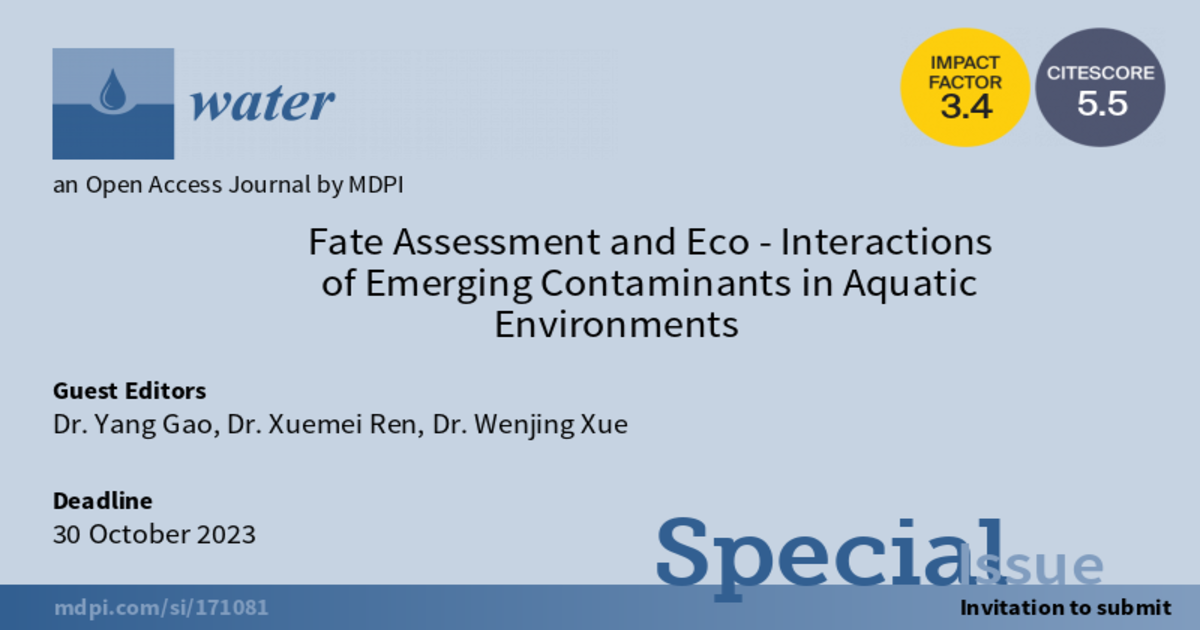Fate Assessment and Eco-Interactions of Emerging Contaminants in Aquatic Environments
A special issue of Water (ISSN 2073-4441). This special issue belongs to the section "Water Quality and Contamination".
Deadline for manuscript submissions: closed (30 October 2023) | Viewed by 419

Special Issue Editors
Interests: emerging contaminants; nanomaterials; natural surface waters; environmental behavior; bio-toxicity; microbial diversity; toxicity mechanisms; environmental risks
Special Issues, Collections and Topics in MDPI journals
Interests: nanomaterials; environmental behavior; aggregation mechanisms; environmental interface chemistry; pollution control
Special Issue Information
Dear Colleagues,
With continuing societal development, the harmful effects of emerging pollutants on the ecological environment and human health are becoming increasingly apparent. Emerging pollutants are those generated through human production activities that have not yet been regulated, or are insufficiently regulated, and can harm life and the ecological environment; these include environmental endocrine disruptors, new persistent organic pollutants, microplastics, engineered nano-materials, antibiotics, etc.
Emerging pollutants have the following characteristics (as reported in the Research Report on the Development Strategy for Environmental Earth Science developed by the National Natural Science Foundation of China (Earth Science Department)): (1) they are large in variety and quantity; (2) they have unique physicochemical properties; (3) they are difficult to analyze and detect; (4) they possess special toxic effects and mechanisms; (5) they undergo a constant trend of replacement and evolution; and (6) there is great uncertainty regarding their transmission and exposure risks. As such, the environmental geochemistry of emerging pollutants is different to that of traditional pollutants, and they therefore require interdisciplinary collaborative research.
Research on the environmental behavior, ecological and health risks, and technologies for controlling emerging pollutants is necessary if the international community's demand for environmental pollution control measures is to be met. Of particular importance are the migration and transformation of emerging pollutants in aquatic environments, environmental fate, regional ecological effects, human health effects, and exposure risk assessment. This research will have significant theoretical and practical significance regarding strengthening the prevention, control, and risk reduction of pollution, and the coordinated development of regional economies and the environment.
Dr. Yang Gao
Dr. Xuemei Ren
Dr. Wenjing Xue
Guest Editors
Manuscript Submission Information
Manuscripts should be submitted online at www.mdpi.com by registering and logging in to this website. Once you are registered, click here to go to the submission form. Manuscripts can be submitted until the deadline. All submissions that pass pre-check are peer-reviewed. Accepted papers will be published continuously in the journal (as soon as accepted) and will be listed together on the special issue website. Research articles, review articles as well as short communications are invited. For planned papers, a title and short abstract (about 100 words) can be sent to the Editorial Office for announcement on this website.
Submitted manuscripts should not have been published previously, nor be under consideration for publication elsewhere (except conference proceedings papers). All manuscripts are thoroughly refereed through a single-blind peer-review process. A guide for authors and other relevant information for submission of manuscripts is available on the Instructions for Authors page. Water is an international peer-reviewed open access semimonthly journal published by MDPI.
Please visit the Instructions for Authors page before submitting a manuscript. The Article Processing Charge (APC) for publication in this open access journal is 2600 CHF (Swiss Francs). Submitted papers should be well formatted and use good English. Authors may use MDPI's English editing service prior to publication or during author revisions.
Keywords
- emerging contaminants
- aquatic environments
- environmental behavior
- bio-toxicity
- environmental risks
- ecological effect
- microscopic mechanism
- human health







